|

Ukrainian Easter in Bradford
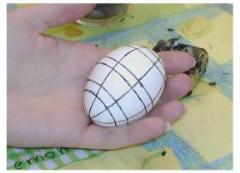 Easter is the most important date in the Christian calendar. We recall Christ's suffering on the cross, but through His Resurrection, feel renewed hope and energy for the year ahead. In Ukraine, people prepared themselves for Easter both practically and spiritually. When our parents and grandparents came to England, they brought with them a number of these customs, which we strive to maintain.
Easter is the most important date in the Christian calendar. We recall Christ's suffering on the cross, but through His Resurrection, feel renewed hope and energy for the year ahead. In Ukraine, people prepared themselves for Easter both practically and spiritually. When our parents and grandparents came to England, they brought with them a number of these customs, which we strive to maintain.
During Lent, the forty day period preceding Easter, Christians prepare their souls for Easter Day, through fasting and abstinence. Traditionally, our ancestors did not eat meat, milk, eggs, butter and cheese. Now, we are less strict and people will not eat meat on Fridays during the lenten period, as well as denying themselves certain types of food or recreational activities.
On Palm Sunday, Christians commemorate the entry of Jesus into Jerusalem on a donkey. In Ukraine, palms were expensive or difficult to obtain and so in place of these, pussy willow branches were blessed during the Palm Sunday Service, something which takes place in our Ukrainian churches in Bradford. Following Mass, members of the congregation gently tap each other with the branches and say:
"I do not hit you, the pussy willow hits you; a week today it will be Easter Sunday".
In this way, they wish each other good health, happiness and prosperity. The blessed pussy willow branches are also laid over pictures in the house for good fortune in the coming year.
During Holy Week, houses were cleaned and whitewashed. Pysanky - colourful Ukrainian Easter eggs - were completed at the start of the week, and pasky - a sweetened bread, which forms the centre-piece of the Easter basket - were baked in preparation for Easter. These tasks had to be completed by Holy Thursday, for traditionally no work should be done from this day until after the Easter celebrations. Modern life in England is not necessarily receptive to the wishes of our ancestors and therefore these observances and rituals may have to be modified. Many people will not bake their pasky until Good Friday itself and I have heard people say that they bake their pasky in advance and freeze them! Each year in CYM, sumivti spend several weeks before Easter making their own pysanky, using wax and dyes, to put in to their Easter baskets.
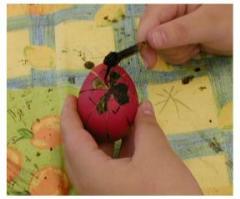 On Good Friday, no meat or dairy products are eaten. In Bradford's Ukrainian Catholic Church, as in Ukraine, the Plaschanytsia - the Holy Shroud - is laid out in the evening and is guarded until it is put away on Easter Saturday evening. During this time, people visit the Plaschanytsia to pray and kiss the wounds of Christ. In Bradford, sumivti take it in turns to guard the Plaschanytsia throughout this period.
On Good Friday, no meat or dairy products are eaten. In Bradford's Ukrainian Catholic Church, as in Ukraine, the Plaschanytsia - the Holy Shroud - is laid out in the evening and is guarded until it is put away on Easter Saturday evening. During this time, people visit the Plaschanytsia to pray and kiss the wounds of Christ. In Bradford, sumivti take it in turns to guard the Plaschanytsia throughout this period.
To celebrate the end of the lenten period, Ukrainians partake in an Easter breakfast. The symbolic foods are laid in a basket and are blessed in preparation for Easter Sunday morning. The baskets contain paska, eggs, ham, sausage, cheese, butter, salt and horseradish, as well as pysanky. In Ukraine, the blessing of the baskets was carried out after the Resurrection Mass on Easter morning, outside the church. Here, it is usually done on Easter Saturday and families partake in the holy meal on Easter Sunday, when, now that Lent is over, they quite literally 'break fast'.
The Resurrection Mass takes place on Easter morning, when we celebrate the rise of Jesus from the dead. Following Mass in Ukraine girls from the villages would perform spring dances called hahilky in the churchyards. In Bradford, young sumivti also perform hahilky for the Easter congregation outside the church, which they have learned during CYM.
Our Easter customs have meanings related to our pagan and religious pasts. Although we live in a fast-paced, multicultural society, by educating our sumivti about Ukrainian Easter, the most important of religious festivals, we endeavour to preserve these traditions to the best of our abilities in the hope that they will stay with us for many years to come.
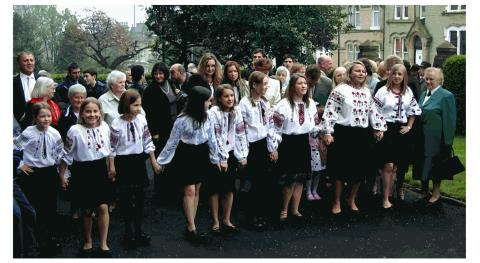
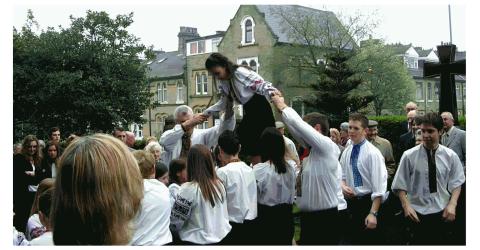
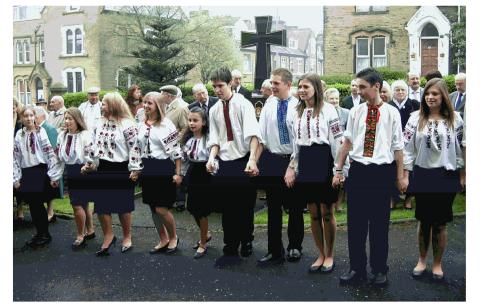
 |



